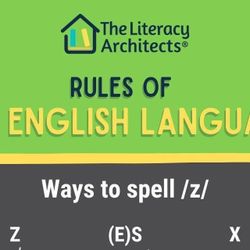Sep 11, 2024
Rules of ending "s", "z", "ed"

In English, the letter "s" can represent both the sounds /s/ (like in "sit") and /z/ (like in "wise"). Here are some general rules to help determine whether to pronounce "s" as /s/ or /z/:
### 1. **Between Two Vowels or Voiced Consonants:**
- When "s" appears between two vowels or a voiced consonant and a vowel, it is usually pronounced as /z/.
- Examples:
- *wise* (/wʌɪz/)
- *raise* (/reɪz/)
- *cousin* (/ˈkʌzən/)
### 2. **Plural, Third-Person Singular, and Possessive Endings:**
- For plural nouns, third-person singular verbs, or possessives, the pronunciation of "s" depends on the final sound of the root word.
- If the root word ends with a **voiceless consonant** (like /p/, /t/, /k/), the "s" is pronounced as /s/.
- Examples: *cats* (/kæts/), *hops* (/hɒps/)
- If the root word ends with a **voiced consonant** (like /b/, /d/, /g/, or a vowel sound), the "s" is pronounced as /z/.
- Examples: *dogs* (/dɒgz/), *flies* (/flaɪz/)
### 3. **At the Beginning of a Word:**
- When "s" appears at the beginning of a word, it is usually pronounced as /s/.
- Examples: *sit* (/sɪt/), *see* (/siː/)
### 4. **Suffix "-ism," "-ize," and "-ise":**
- Words ending in "-ism" typically have the /z/ sound.
- Example: *realism* (/ˈrɪəˌlɪzəm/)
- In American English, "-ize" is common, pronounced with a /z/.
- Example: *realize* (/ˈrɪəlaɪz/)
- In British English, "-ise" can also be used, but it’s still pronounced with a /z/.
- Example: *realise* (/ˈrɪəlaɪz/)
### 5. **Root Words Ending in "s":**
- When the root word ends with a silent "e," like in *raise* or *wise*, the "s" is usually pronounced as /z/.
- Example: *raise* (/reɪz/), *wise* (/waɪz/)
These rules can help guide pronunciation, but keep in mind that English has many exceptions, so practice and familiarity are key.
1. /ɪd/ or /əd/ Sound (Extra syllable)
When the base verb ends with a /t/ or /d/ sound, "-ed" is pronounced as /ɪd/ or /əd/, adding an extra syllable.
Examples:
waited (/ˈweɪtɪd/)
needed (/ˈniːdɪd/)
painted (/ˈpeɪntɪd/)
2. /t/ Sound (No extra syllable)
When the base verb ends with a voiceless consonant (except /t/), "-ed" is pronounced as /t/. Voiceless consonants are sounds where the vocal cords don’t vibrate (e.g., /p/, /k/, /f/, /s/, /ʃ/).
Examples:
kissed (/kɪst/)
looked (/lʊkt/)
laughed (/læft/)
hoped (/hoʊpt/)
3. /d/ Sound (No extra syllable)
When the base verb ends with a voiced consonant (except /d/) or a vowel sound, "-ed" is pronounced as /d/. Voiced consonants are sounds where the vocal cords vibrate (e.g., /b/, /g/, /v/, /z/, /ʒ/, and all vowel sounds).
Examples:
loved (/lʌvd/)
played (/pleɪd/)
opened (/ˈoʊpənd/)
called (/kɔːld/)
For verbs that end in a /t/ or /d/ sound, the -ed ending is pronounced /ɪd/. The verbs bat, knit, flood, and guide all end in either /t/ or /d/, so when -ed is added it is pronounced /ɪd/:
bat /bæt/ → batted /bætɪd/
knit /nɪt/ → knitted /nɪtɪd/
flood /flʌd/ → flooded / flʌdɪd/
guide /gaɪd/ → guided /gaɪdɪd/
The other two pronunciations of -ed are based on the voicing of the last sound of the verb. A voiced sound is one that causes your vocal cords to vibrate when you speak. A voiceless sound is one that does not cause your vocal cords to vibrate when you speak. You can tell the difference by putting your hand on your throat when you speak. For example, when you say /m/ and /f/ the sound /m/ is voiced and /f/ is voiceless.
When the last sound of a verb is voiced and is not /d/ the -ed is pronounced /d/. The following verbs all end in a voiced sound, so the -ed is pronounced /d/:
rue /ruː/ → rued / ruːd/
clean /kliːn/ → cleaned / kliːnd/
flow /floʊ/ → flowed / floʊd/
hog /hɑːg/ → hogged / hɑːgd/
amuse /əˈmjuːz/ → amused / əˈmjuːzd/
call /kɑːl/ → called / kɑːld/
When the last sound of a verb is voiceless and is not /t/ then the -ed is pronounced /t/. The following verbs all end in a voiceless sound, so the -ed is pronounced /t/.
stop /stɑːp/ → stopped /stɑːpt/
access /ækˌsɛs/ → accessed /ækˌsɛst/
huff /hʌf/ → huffed /hʌft/
wash /wɑːʃ/ → washed /wɑːʃt/
kiss /kɪs/ → kissed /kɪst/
wink /wɪŋk/ → winked /wɪŋkt/
By undefined
4 notes ・ 1 views
English
Beginner